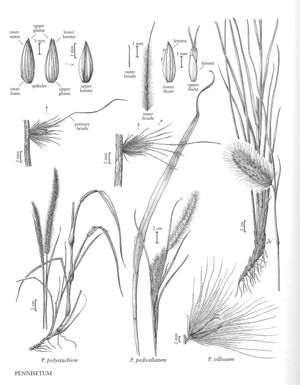Difference between revisions of "Pennisetum polystachion"
FNA>Volume Importer |
FNA>Volume Importer |
(No difference)
| |
Revision as of 19:22, 24 September 2019
Plants annual or perennial; cespitose from a hard, knotty base. Culms 30-200 cm, erect, branching; nodes glabrous. Sheaths glabrous, margins ciliate; ligules 1.5-2.7 mm; blades 15-55 cm long, 4-18 mm wide, flat, glabrous or pubescent. Panicles terminal, 10-25 cm long, 15-30 mm wide, fully exerted from the sheaths, erect to drooping, white, yellow, light brown, or pink to deep purple; rachises terete, scabrous. Fascicles 33-45 per cm, disarticulating at maturity; fascicles axes 0.2-0.5 mm, with 1 spikelet; outer bristles 13-30, 1.3-5 mm, scabrous; inner bristles 6-14, 4.3-11.5 mm, long ciliate; primary bristles 14-25 mm, long-ciliate, noticeably longer than the other bristles. Spikelets 3-4.5 mm, sessile; lower glumes absent or to 2 mm, veinless; upper glumes 3-4.5 mm, glabrous, 5-7-veined, 3-lobed; lower florets sterile or staminate; lower lemmas 3-3.9 mm, 5-7-veined, apices lobed; lower paleas 2.9-3.7 mm; anthers absent or 1.7-2 mm; upper florets disarticulating at maturity; upper lemmas 1.7-3 mm, coriaceous, shiny, 5-veined, apices ciliate; anthers 1.3-2.1 mm. Caryopses about 1.7 mm, concealed by the lemma and palea at maturity. 2n = 18, 36, 45, 48, 52, 53, 54, 56, 78.
Distribution
Puerto Rico, Tex., Fla., Pacific Islands (Hawaii)
Discussion
Pennisetum polystachion is a polymorphic, weedy African species that has become established in the tropics and subtropics, including Florida. The U.S. Department of Agriculture considers it a noxious weed. Only Pennisetum polystachion subsp. setosum (Sw.) Brunken has been found in the Flora region. It differs from P. polystachion (L.) Schutt. subsp. polystachion as indicated:
Selected References
None.
Lower Taxa
Key
| 1 | Plants annual, usually profusely branching; fascicles white, pink, red, or deep purple | Pennisetum polystachion subsp. polystachion |
| 1 | Plants perennial, usually sparingly branched; fascicles yellow, light brown, or purplish | Pennisetum polystachion subsp. setosum |
